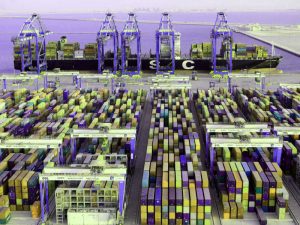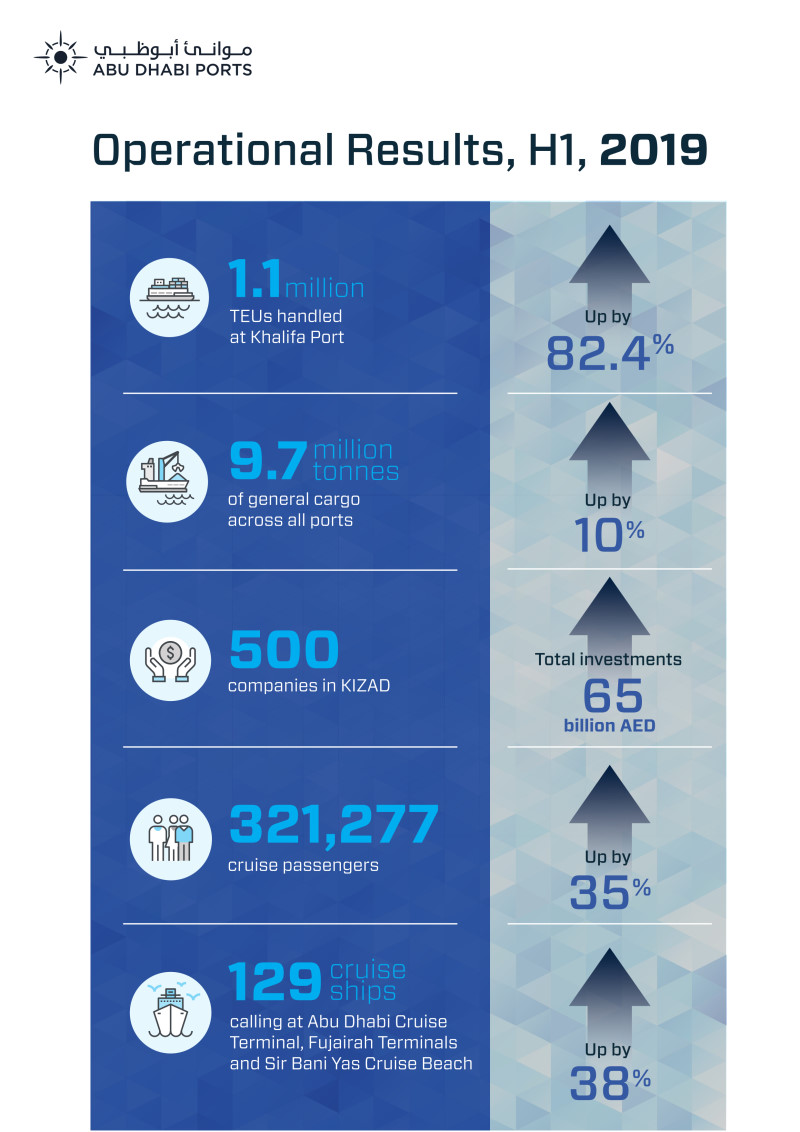Total cargo handled across all Abu Dhabi Ports is up 10%
Abu Dhabi Ports, has reported robust operational performance with significant volume growth in the first half of 2019. The company, which operates ports and terminals across the UAE, as well as Khalifa Industrial Zone Abu Dhabi (KIZAD), said its success was driven in part by concession agreements signed with leading maritime firms, such as Mediterranean Shipping Company (MSC) and COSCO Shipping Ports (CSP).
 The agreements have seen an increase in the number of vessels taking advantage of Khalifa Port’s strategic location and world-class facilities, as well as significant further investment in advanced technologies and infrastructure.
The agreements have seen an increase in the number of vessels taking advantage of Khalifa Port’s strategic location and world-class facilities, as well as significant further investment in advanced technologies and infrastructure.
Container volume at Khalifa Port rose from 620,974 TEU (Twenty-foot Equivalent Unit) in H1-2018 to 1,135,021 TEU in H1-2019, an increase of 82.4%. This growth was fuelled predominantly through the MSC concession agreement, which was signed last year.
Abu Dhabi Ports anticipates further growth thanks to completion of the CSP Abu Dhabi Container Terminal, which was built in partnership with COSCO Shipping Ports and which began trial operations in Q2-2019, ahead of the start of full commercial operations in Q4-2019.
Both agreements are part of Abu Dhabi Ports’ five-year strategy to boost the UAE’s trade and investment flows, and drive the diversification of the UAE economy. As a result, Abu Dhabi Ports will be expanding the capacity of Khalifa Port to 9.1mn by 2024.
The port is capable of handling the world’s largest vessels with two 21,000 TEU mega-vessels, the COSCO Shipping Solar and Pisces having already called at CSP Abu Dhabi Terminal earlier this year.
“Despite a challenging international environment for the trade and logistics sectors in recent years, our industry continues to grow from strength to strength in the UAE. I am delighted that Abu Dhabi Ports is playing a key role in ensuring that our nation is at the heart of trade, industry and logistics in the Middle East,” commented Falah Mohammad Al Ahbabi, Chairman, Abu Dhabi Ports.
“With the commencement of commercial operations at CSP Abu Dhabi Container Terminal and the rejuvenation of Port of Fujairah on track through our joint venture with Fujairah Terminals, we expect our strong growth to continue. Our success is a testimony to the fact that more and more firms are realising the opportunities that Abu Dhabi offers across the Middle East, Africa and Asia, as well as along China’s Belt and Road maritime route,” noted Captain Mohamed Juma Al Shamisi, CEO, Abu Dhabi Ports.
In addition to the increase in container volume, Abu Dhabi Ports also witnessed a significant increase in the total volume of cargo handled across its ports, which also include Fujairah Terminals, Zayed Port and Mussafah Port. Total cargo increased to just under 9.7 million tonnes in the first half of 2019, a rise of 10% compared to the same period in 2018.
In June, the first fully-laden Capesize vessel to ever call at a GCC port arrived at Khalifa Port after Abu Dhabi Ports modified the approach channels to accommodate Capesize vessels. The channels have been deepened from 16.5m to 18.5m draft and widened from 250m to 280m.
Meanwhile, KIZAD continues to attract more investment, with agreements signed with DHL Global Forwarding and Gulf Compound Blending Industries in H1-2019, while work was also started on the AED 2.2bn Roadbot Tyre Project.
Once completed, the 275,000 square metre facility will have a production capacity of 10 million Passenger Car Radial (PCR) tyres and 1mn truck and bus radials by 2022. To date, Abu Dhabi Ports has attracted more than 500 companies to KIZAD and more than AED 65bn in investment across multiple sectors, including metals, polymers, oil and gas, automotive, food, energy, and logistics.
Abu Dhabi Ports attributed the slight drop in Roll-on Roll-off (Ro-Ro) figures, from 78,163 units in H1-2018 to 73,590 units this year, to a drop in new car sales.

